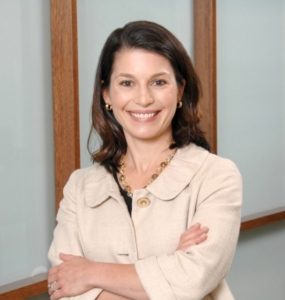Our Spotlight on Flex showcases professionals from member organizations who exemplify personal and professional success while working a flexible schedule. Their stories illustrate the long-term benefits that flexible schedules offer to both individuals and organizations.
October 2020 Spotlight on Flex
For our October Spotlight on Flex, we’re pleased to highlight Tessa Mielke Partner, Dorsey & Whitney (Minneapolis, MN)
Diversity & Flexibility Alliance: How have you made flexibility a priority and a success with your schedule?
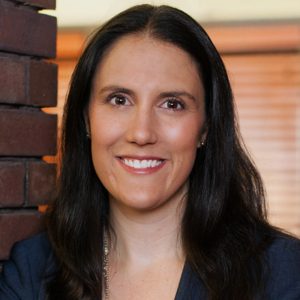 Tessa Mielke: I graduated from law school in 2010 when the legal world seemed to be upside down (though it was certainly less crazy than now!). Because of the Great Recession, I had the opportunity to spend a year working at Harvard Law School’s transactional law clinic before transitioning to a full time associate role in the tax group in the Boston office of Ropes & Gray. In 2013, my husband started his medical residency in Minneapolis; I left Ropes and started at Dorsey & Whitney in their tax, trusts and estates group. I was working a typical full time associate schedule, but reevaluated my work schedule in 2015 after my first child was born. She had a few health concerns, including needing major surgery on her skull (she’s fine now!). I decided to reduce my hours so I could take my daughter to her numerous medical appointments without worrying about the hours I was missing at work.
Tessa Mielke: I graduated from law school in 2010 when the legal world seemed to be upside down (though it was certainly less crazy than now!). Because of the Great Recession, I had the opportunity to spend a year working at Harvard Law School’s transactional law clinic before transitioning to a full time associate role in the tax group in the Boston office of Ropes & Gray. In 2013, my husband started his medical residency in Minneapolis; I left Ropes and started at Dorsey & Whitney in their tax, trusts and estates group. I was working a typical full time associate schedule, but reevaluated my work schedule in 2015 after my first child was born. She had a few health concerns, including needing major surgery on her skull (she’s fine now!). I decided to reduce my hours so I could take my daughter to her numerous medical appointments without worrying about the hours I was missing at work.
I switched to an 80% reduced hours schedule with the intention of ramping back up to full time once we were done with my daughter’s medical appointments. But once that time came and things settled a bit more, I realized that I really appreciated the flexibility of a reduced hours schedule. I still came into the office every day, but I worked shorter hours and could take more vacation days (or sick days to care for my daughter or myself when we inevitably got sick the first few years) while still meeting my work obligations. The result was that both work and my family life were more sustainable.
After about a year and half of working a reduced hours schedule, I decided to increase my hours to 85% to match the hours I’d been putting in while maintain a schedule that worked for me and my family. I’ve been on this schedule ever since. It’s been wonderful, and working a flex schedule has not impeded my career trajectory at all. While working reduced hours, I was promoted to income partner in January 2018 and then to equity partner a year later (even though the typical progression is three to five years from income to equity).
Now with everyone working from home almost exclusively, “coming into the office” is quite different. I’ve still been working shorter hours to meet my family obligations, but I’ve also started using my flex schedule to take one day a month off for self-care and personal projects. This new way of incorporating flexible work has really helped continue to keep my work schedule sustainable.
DFA: How have the firm and/or clients contributed to your Flex Success®?
TM: The firm has clearly been on board with my flex success journey – the biggest example has been with my partnership progression. My practice is really conducive to flex; I work with several clients and on several projects at any given time, which makes it easier to work on fewer matters and still give clients the highest level of service.
My practice group has also been very supportive. We’ve coordinated to make sure my flex schedule works for everyone. For example, my husband is a frontline worker in the hospital, and when the pandemic started, I worried about potentially exposing my colleagues and clients. I stopped coming into the office before the firm mandated teleworking, but I still had matters that required in person signings. Without hesitation, my partners stepped in to oversee those meetings. The point is, pandemic or not, we all work together and support each other.
DFA: How has working flexibly made your career more sustainable and contributed to business/professional development opportunities?
TM: I’m able to provide the same high caliber work and service to the firm and clients because of flexibility. I can work at a pace that doesn’t overshadow my personal goals and family commitments. My flexible schedule has also allowed me to participate in business development opportunities that I wouldn’t have had time for if I was billing at 100%. I’ve been able to expand my professional development with internal clients, too. For example, Dorsey’s Women Attorneys with Children affinity group has been a great source of connecting with other attorneys in the firm with shared experiences. We understand the need for flex and can mentor one another.
DFA: Looking back, would you do anything differently, or what would you tell your younger self?
TM: I would tell myself to not be as nervous about expressing what I need. I worried that people would think I wasn’t as committed by working reduced hours at first. The mentality is quite the opposite though; it’s because I am so committed and want to excel, I knew I had to reduce my hours. I knew I wouldn’t be able to give 100% to the firm, my clients, and my family by working full time. I think it’s important to make it very clear with your colleagues from the beginning that you’re still just as committed to your work. People are understanding and receptive when you take the time to have a real discussion.
I would also be better about periodically reevaluating what my needs are. I used to look for the “answer” on how to balance work and life. But I’ve realized there is no answer that works for everyone or even an answer that works for one person for their entire career. That’s why you need to check-in with yourself on what’s working and what’s not on a regular basis. If it’s not working, then try something else. That’s been especially true for me during this pandemic.
DFA: How do you recharge, and how do you pay it forward?
TM: I’ve learned I need to spend time outside – walk, run, take bike rides – anything that gets me moving in the fresh air. It’s a mental break, and I can shift gears from focusing on work and parenting to focusing on being present. I like to knit too, and have been knitting since law school! I want to keep learning new things, and working on new, complicated knitting patterns helps me relax and refocus.
I pay it forward by informally and formally mentoring summer associates and other young attorneys. The sense of community I’ve found at Dorsey has been a great resource to me; I know that my generation of attorneys will play a major role in paving the way for flexible work and supporting those coming up after us.
— — —
If you are a professional working a flexible schedule and would like to share your story in an upcoming Spotlight on Flex, contact Jane Caldeira.

 Jessamine Lee: Flexibility has been a key to my success at Wolf Greenfield. After coming back to work from having my first child 11 years ago, I went on an 80% schedule. I was a junior associate at the time. I stayed on an 80-90% schedule through having my second child three years later and then becoming Counsel and a Shareholder at the firm. During that same time, I also had a flexible arrangement in which I worked remotely twice a week. The firm was supportive of my requests and made it possible for me to have this alternative work arrangement during a time when it was not common to do so. I had a lot of help from my colleagues. For example, at times when my workload was too high, I was able to transfer work to other colleagues who had more bandwidth at the time. This is a testament to Wolf Greenfield’s collegiality and culture – we work as a team. I also set boundaries, made expectations clear to both my colleagues and clients as to when I was available, and inquired about firm and client expectations as well. Of course, there were times when urgent projects needed to get done, but for the most part everyone was respectful of these boundaries and I was able to meet the expectations of those I worked with.
Jessamine Lee: Flexibility has been a key to my success at Wolf Greenfield. After coming back to work from having my first child 11 years ago, I went on an 80% schedule. I was a junior associate at the time. I stayed on an 80-90% schedule through having my second child three years later and then becoming Counsel and a Shareholder at the firm. During that same time, I also had a flexible arrangement in which I worked remotely twice a week. The firm was supportive of my requests and made it possible for me to have this alternative work arrangement during a time when it was not common to do so. I had a lot of help from my colleagues. For example, at times when my workload was too high, I was able to transfer work to other colleagues who had more bandwidth at the time. This is a testament to Wolf Greenfield’s collegiality and culture – we work as a team. I also set boundaries, made expectations clear to both my colleagues and clients as to when I was available, and inquired about firm and client expectations as well. Of course, there were times when urgent projects needed to get done, but for the most part everyone was respectful of these boundaries and I was able to meet the expectations of those I worked with.
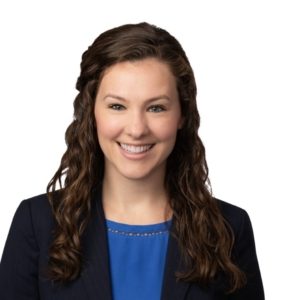 Katelyn Miller: Upon returning from maternity leave after the birth of my first child in 2015, I transitioned to an alternative schedule. I had wonderful role models at my prior firm who guided me through the process of requesting and moving to a flexible schedule. When my daughter was one, I moved to Seyfarth. After receiving an offer, I very nervously called the head of our Litigation Department and asked whether I could join the firm on an 80% schedule. Within hours, I received a response that Seyfarth would be happy to accommodate my schedule. It was clear from the beginning that in addition to providing exceptional client service, Seyfarth truly valued its team members and provided different opportunities and avenues for its professionals to succeed.
Katelyn Miller: Upon returning from maternity leave after the birth of my first child in 2015, I transitioned to an alternative schedule. I had wonderful role models at my prior firm who guided me through the process of requesting and moving to a flexible schedule. When my daughter was one, I moved to Seyfarth. After receiving an offer, I very nervously called the head of our Litigation Department and asked whether I could join the firm on an 80% schedule. Within hours, I received a response that Seyfarth would be happy to accommodate my schedule. It was clear from the beginning that in addition to providing exceptional client service, Seyfarth truly valued its team members and provided different opportunities and avenues for its professionals to succeed.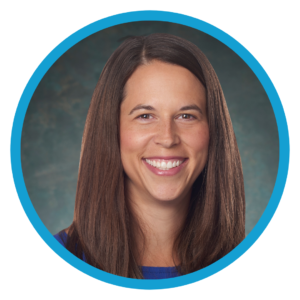 Liz Dillon, Partner, Lathrop GPM LLP
Liz Dillon, Partner, Lathrop GPM LLP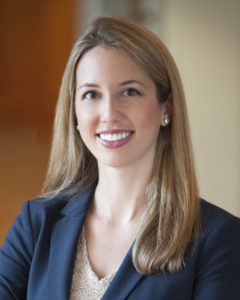 Elise Attridge: After my first child was born in 2016, I started working at an 80% reduced hour schedule. At that time, I had been a Litigation Associate at Morgan Lewis for five years.
Elise Attridge: After my first child was born in 2016, I started working at an 80% reduced hour schedule. At that time, I had been a Litigation Associate at Morgan Lewis for five years. Diversity & Flexibility Alliance: How have you made flexibility a priority and a success with your schedule? How has the firm and/or your clients contributed to this?
Diversity & Flexibility Alliance: How have you made flexibility a priority and a success with your schedule? How has the firm and/or your clients contributed to this? Tessa Mielke: I graduated from law school in 2010 when the legal world seemed to be upside down (though it was certainly less crazy than now!). Because of the Great Recession, I had the opportunity to spend a year working at Harvard Law School’s transactional law clinic before transitioning to a full time associate role in the tax group in the Boston office of Ropes & Gray. In 2013, my husband started his medical residency in Minneapolis; I left Ropes and started at Dorsey & Whitney in their tax, trusts and estates group. I was working a typical full time associate schedule, but reevaluated my work schedule in 2015 after my first child was born. She had a few health concerns, including needing major surgery on her skull (she’s fine now!). I decided to reduce my hours so I could take my daughter to her numerous medical appointments without worrying about the hours I was missing at work.
Tessa Mielke: I graduated from law school in 2010 when the legal world seemed to be upside down (though it was certainly less crazy than now!). Because of the Great Recession, I had the opportunity to spend a year working at Harvard Law School’s transactional law clinic before transitioning to a full time associate role in the tax group in the Boston office of Ropes & Gray. In 2013, my husband started his medical residency in Minneapolis; I left Ropes and started at Dorsey & Whitney in their tax, trusts and estates group. I was working a typical full time associate schedule, but reevaluated my work schedule in 2015 after my first child was born. She had a few health concerns, including needing major surgery on her skull (she’s fine now!). I decided to reduce my hours so I could take my daughter to her numerous medical appointments without worrying about the hours I was missing at work.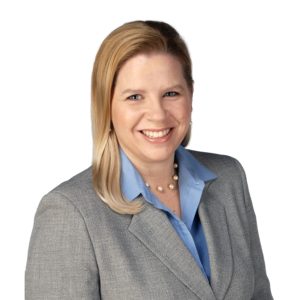 Colleen Haas: It’s hard to believe, but I’ve been at the firm for over 20 years. I started here during my 2L summer internship and then as a first year associate right after graduation from Notre Dame Law School in 1997. After I had my first child, I reduced my hours to 90% of my original billable hour requirement but still came into the office five days a week. When I had my second child three years later, I reduced my billable goal a little more and changed my schedule slightly by coming into the office four days a week and working one day remotely.
Colleen Haas: It’s hard to believe, but I’ve been at the firm for over 20 years. I started here during my 2L summer internship and then as a first year associate right after graduation from Notre Dame Law School in 1997. After I had my first child, I reduced my hours to 90% of my original billable hour requirement but still came into the office five days a week. When I had my second child three years later, I reduced my billable goal a little more and changed my schedule slightly by coming into the office four days a week and working one day remotely. Diversity & Flexibility Alliance: How have you made flexibility a priority and a success with your schedule?
Diversity & Flexibility Alliance: How have you made flexibility a priority and a success with your schedule?  Diversity & Flexibility Alliance: How have you made flexibility a priority and a success with your schedule?
Diversity & Flexibility Alliance: How have you made flexibility a priority and a success with your schedule? 